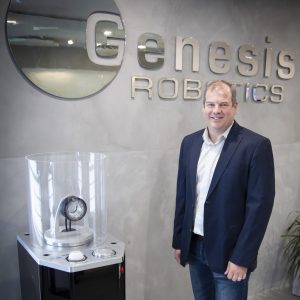
Genesis Robotic’s builds teamwork between man & machine
By Sohail Kamal, West Coast Correspondent
Automation / Robotics Electronics Engineering Robotics roboticsWhat began as a research and design company about four years ago, Genesis Robotics of Langley BC has its sites firmly focused on creating parts that will change how machines are built and how they move.

Genesis Robotic CEO, Justin Currie
Founded in 2015 by Michael Gibney and James Klassen, Genesis Robotics took a significant developmental step forward in April 2018, as the firm entered into a strategic venture with Koch Industries. Koch is the second largest privately held company in the United States with annual revenue of $115 billion. This level of investment interest is further demonstrated by Koch’s support in helping commercialize Genesis’ LiveDrive electric motor and Reflex gearing technology.
West Coast Report sat down with Genesis Robotic’s CEO, Justin Currie, to learn how their technology aids the world of manufacturing and how the partnership with Koch widens their audience.
“Our co-founder, James Klassen spent decades tackling complex problems. Four years ago, he and a small team decided to take on big obstacles in the robotics,” says Currie, adding that Genesis saw an opportunity in mechanical actuation. “The movement for robots is based on technology that hasn’t changed much in 50-years. We set out to change that with a novel approach to motor and gearbox designs. The fact that we are one of the few companies that design critical tools for problems faced by OEMs has allowed us to stand out.”
Convergence of AI, sensors and improved robotics actuation
Genesis’ purpose as a company is to enrich lives through ever-increasing freedom and mobility. This helps to keep their team focused on bringing technology to market that facilitates development. The convergence of AI, sensors and improved robotics actuation will bring down production costs and provide greater value to customers, and Genesis wants to help bring these improvements to the world. Genesis employs more than 60 staff, which does not include the president of Koch Chemical Technology Group, who helps oversee operations. Gaining the support of Koch Industries has been vital in Genesis’ growth and long-term sustainability, according to Currie.
“We have the ability to add the necessary pieces, whether that is more engineers or updating our facilities. On top of the obvious financial aspect of their investment, we have been able to leverage their expertise and their expansive network of resources across the globe,” notes Currie.
Koch’s global reach in marketing and commercialization, as well as its history of successfully growing businesses, has helped provide Genesis with exposure to companies which will incorporate the firm’s technologies in the future. Genesis, like many R&D organizations, has had its share of challenges as well. The company’s ideas originated from a highly collaborative and creative environment. So, as its grows, the firm is working to ensure its culture of innovation, risk-taking and embracing failures will allow new ideas to be cultivated.
Genesis will improve productivity and safety
“Bringing in people who have a huge depth of experience with these types of transitions has helped. I would suggest that while technology breakthroughs and funding may seem to be the biggest challenge as a business, it is usually the people. Hiring for fit and establishing the values that embody the organization is essential to enable growth,” suggests Currie.
When asked about how Genesis will improve productivity and safety, Currie says “the high torque and low inertia in our direct-drive motors enable abrupt stopping and the ability to reverse directions instantaneously if it makes contact with an object.” In the future, he sees combining LiveDrive with the low ratio and highly backdriveable gearboxes – which will enable high-performance actuators, leading to robots that are more human-like. This will ramp-up productivity and workplace flexibility because workers and robots will be able to work more closely together. Genesis also has compelling technology that solves pain points.
“From an original technology standpoint, the LiveDrive has higher torque-to-weight than existing direct-drive motors, which is extremely rare in our industry,” states Currie. “Our actuators can be inserted easily in arm joints because our direct-drive technology simplifies the integration since no belts or pulleys are required. Because of the smaller form factor and larger through hole, they allow more design flexibility for robotics engineers.”
Making new motors fit a robotics company’s design specifications can be a challenge. Genesis works closely to their customer’s product specifications in order to deliver custom solutions. In addition to sending test kits, the firm is currently speaking with several high profile robotics manufacturers and evaluating where the best fit is.
